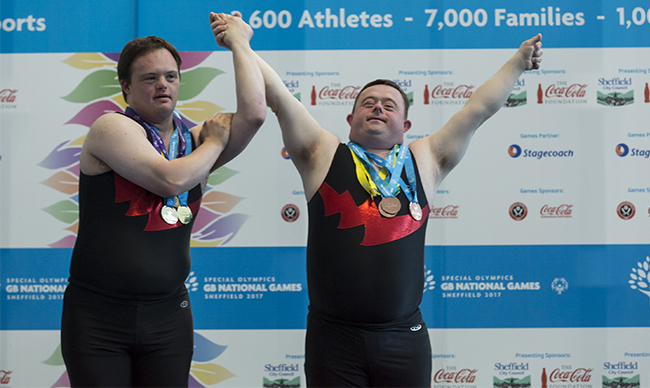
ATHLETES with a learning disability continue to face exclusion from most sports at the Paralympics.
Just 13 Team GB athletes with a learning disability will be flying to compete in Japan at this year’s Paralympics (24 August – 5 September) – out of a total of 209 disabled athletes.
And they can only compete in three of the 22 sports – athletics, swimming and table tennis.
London 2012 saw the reintroduction of athletes with a learning disability to the Paralympics following a 12-year ban after the Spanish basketball team were found to have faked having a learning disability in order to compete.
Edel Harris, chief executive of the learning disability charity Mencap, said: “Why is it, when we are constantly talking about the need for greater inclusion, that people with a learning disability are still excluded from so much at the Paralympics?
“It’s been 21 years since athletes with a learning disability were banned from competing in the games – something that has left a terrible legacy, long-lasting exclusion, and meant even fewer opportunities for representation of people with a learning disability on a world stage.
“Learning disability is still so misunderstood, and seeing more athletes with a learning disability competing at the Paralympics would help to fight stigma in wider society.
“It is also deeply unfair on the talented athletes with a learning disability who cannot compete alongside their disabled peers.
“We want the International Paralympic Committee to act so that people with a learning disability get the opportunities they deserve. UK sports organisations also need to commit to more funding so that more athletes with a learning disability can compete in the Paralympics.”
Abdul Hameed, who has a learning disability and is a Sports Co-Trainer at Mencap, said: “At the moment there aren’t enough opportunities at the Paralympics. It’s absolutely not right. There shouldn’t be any barriers to getting involved in sport if you have a learning disability or not – it’s unfair.
“There is also not enough representation of people with a learning disability in sports generally. For me, sport has helped me to meet people. It gives me a boost and a sense of belonging. In my role as a co-trainer, I deliver workshops to sports providers to explain what it’s like to have a learning disability, and I also have an eye condition so I talk about that.
“I think my role helps to change attitudes but there is still a long way to go to include more people with a learning disability in sports, and in the Paralympics.”
The Fake Paralympians
TO RAISE awareness of the issue, the BBC World Service is releasing a new six-part documentary ‘The Fake Paralympians’, starting tonight (August 17).
The series, presented by British ex-Paralympic swimmer Dan Pepper who has a learning disability, -investigates the Spanish basketball team’s cheating scandal which led to the ban and left a lasting shadow.
Vijay Patel, Campaigns Assistant at Mencap, and who has a learning disability, said: “I am glad that this issue is getting more attention, and it’s fantastic that the BBC is doing a series about it and that this is presented by someone who has a learning disability.
“When I watch and listen to programmes I don’t see or hear many people with a learning disability, and this isn’t inclusive. It’s important for people with a learning disability to be represented in the TV and radio, and also in sport, so those tuning in can better understand learning disability. This is so important in improving understanding of learning disability in society.”
Helpline: 0808 808 1111 (10am-3pm, Monday-Friday) or email helpline@mencap.org.uk
What is a learning disability?
- A learning disability is a reduced intellectual ability which can cause problems with everyday tasks – for example shopping and cooking, or travelling to new places – which affects someone for their whole life;
- Learning disability is NOT a mental illness or a learning difficulty, such as dyslexia. Very often the term ‘learning difficulty’ is wrongly used interchangeably with ‘learning disability’;
- People with a learning disability can take longer to learn new things and may need support to develop new skills, understand difficult information and engage with other people.
- The level of support someone needs is different with every individual. For example, someone with a severe learning disability might need much more support with daily tasks than someone with a mild learning disability.

